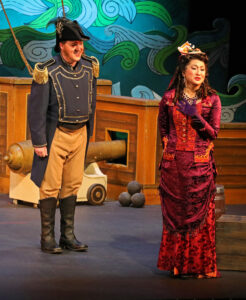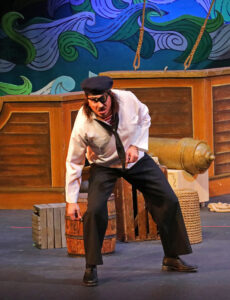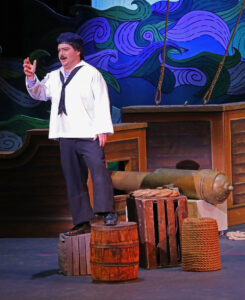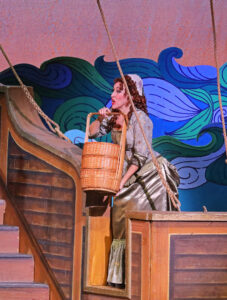from the Nashville Opera
Gilbert and Sullivan’s H.M.S. Pinafore
“We sail the ocean blue, and our saucy ship’s a beauty; We’re sober men and true, and attentive to our duty!”
This boisterous opening chorus immediately set the tone for the Nashville Opera’s production of the silly, seafaring adventure of the H.M.S. Pinafore (or, the Lass that Loved a Sailor). I attended the opening-night performance on January 24, 2025, in the James K. Polk Theater at the Tennessee Performing Arts Center, downtown Nashville.

H.M.S. Pinafore tells the story of Josephine, the daughter of Captain Corcoran, who loves the lowly sailor Ralph Rackstraw. However, her father intends for her to marry Sir Joseph Porter, the First Lord of the Admiralty. The operetta satirizes the rigid social hierarchy of Victorian England, mocking the ridiculousness of class distinctions and the importance placed on birthright and social standing.
Through a mischievous mingling of wry lyrics (even caustic at times) and infectious tunes, the Nashville Opera effectively conveyed Gilbert and Sullivan’s intent on hilariously skewering the pomposity of the blustering Captain and the self-important First Lord. Their nonsensical adherence to social hierarchy made them prime targets for the play’s satirical ridicule, as the company brought their characters to life with vigorous energy and charm. Meanwhile, the production vibrantly emphasized the ideals of love and equality as understood in the Victorian era, drawing parallels to contemporary social justice issues and revealing the persistent challenges of such fortuitous and despotic distinctions in society. The revelation of a long-concealed secret—Captain Corcoran and Ralph Rackstraw were switched at birth—at the opera’s climax dramatically inverts the social order, underscoring the arbitrary nature of class boundaries and ultimately allowing Josephine and Ralph’s love to prevail.
The absurdist essence of H.M.S. Pinafore finds its roots in the earlier creations of Sir William S. Gilbert (1836-1911), the renowned poet and librettist. Particularly influential were his “Bab Ballads,” or a series of lighthearted verses published under the pen name “Bab” in the aptly titled British humor magazine, Fun, during the mid-to-late 1800s. These ballads served as a wellspring of inspiration, providing Gilbert with a treasure trove of quirky characters, comical scenarios, and clever wordplay that he would later skillfully adapt for theatrical performances.
Also, H.M.S. Pinafore represents a significant milestone in Sir Arthur S. Sullivan’s (1842-1900) career as a light opera composer. While the score still bears traces of European operetta influences, it marks the birth of a distinctly English musical style. Sullivan deftly weaves elements of sea shanties and patriotic tunes into his compositions, crafting a unique sonic landscape. The musical repertoire of Pinafore is diverse, ranging from rousing group numbers to tender love duets. Each piece is carefully crafted to complement Gilbert’s clever wordplay, consisting of asinine humor and puns, while propelling the narrative forward. This opera demonstrates Sullivan’s increasingly sophisticated approach to the genre, striking a delicate balance between musical innovation and storytelling support. Sullivan’s ability to match music to Gilbert’s keen sense of farce, while also maintaining narrative momentum, highlights the composer’s evolving artistic prowess and his pivotal role in shaping the Savoy opera tradition.

Among the Nashville Opera’s standout performers, Eric McKeever’s portrayal of the Right Honourable Sir Joseph Porter, First Lord of the Admiralty, deserves special commendation. McKeever brilliantly captured the essence of what audiences expect from a Gilbert and Sullivan production, delivering a performance that was both captivating and true to the character’s spirit.
His commanding stage presence and impeccable comedic timing allowed viewers to revel in Sir Joseph’s pretentious and buffoonish behavior without a shred of guilt. McKeever’s interpretation struck the perfect balance between absurdity and charm, eliciting hearty laughter from the audience throughout his scenes.
Particularly noteworthy was McKeever’s rendition of “When I was a Lad, I Served a Term.” In this musical number, he masterfully recounted Sir Joseph’s ascent to the position of First Lord of the Admiralty. McKeever’s performance skillfully highlighted the ironic contrast between the character’s professed dedication to strict discipline and the reality of his political maneuvering. His delivery of the following lines was especially poignant:
I grew so rich that I was sent
By a pocket borough into Parliament.
I always voted at my party’s call,
And I never thought of thinking for myself at all.
These verses, delivered with McKeever’s expert blend of pride and obliviousness, offered a satirical commentary on political climbing that resonates even with modern audiences. His performance deftly underscored the timeless nature of Gilbert and Sullivan’s critique of bureaucratic incompetence and blind party loyalty, drawing subtle parallels to contemporary political landscapes without overstepping into heavy-handedness.

Yeonjae Cho’s performance as Josephine, the Captain’s daughter, was noteworthy. Her performance of “Sorry Her Lot Who Loves Too Well” showcased her beautiful singing voice as Josephine expresses her love for the lowly sailor, Ralph Rackstraw. This particular number felt like a lull in the production’s energy, especially following the lively chorus of “We Sail the Ocean Blue.” However, this seems to be a common challenge in other Pinafore productions I have seen and should not be viewed wholly as a shortcoming of Cho’s performance. Later in the second act Cho effectively conveyed Josephine’s distress and truly shined, bringing the character to life with renewed energy and comedic depth.
Zachary Taylor’s portrayal of Ralph Rackstraw was a highlight of the production. Taylor skillfully navigated the character’s devotion to his duties as a loyal crewman in the Royal Navy, while also comically conveying his endearing humility through a trembling voice during the speaking parts. Most notably, Taylor’s performance of “A Maiden Fair to See” captured the sailor’s lovesick vulnerability with sincerity while poking fun of the moment’s emotional depth. Another particularly memorable moment was when Taylor, breaking the “fourth wall,” seemed to react spontaneously to the incorrect height of a noose thrown his way, signaling to the stage crew to raise it, drawing much laughter from the audience. This tongue-and-cheek interaction showcased Taylor’s deep understanding of the moment and the spirit of the production.
Equally impressive was Andrew Payne’s portrayal of the satirically incompetent Captain Corcoran. Payne deftly balanced the character’s ineptitude with his rich baritone voice, delivering a wonderfully caricaturized performance that underscored the humorous absurdity of the role. Additionally, the supporting cast delivered standout performances. Keaton Brown as Bill Bobstay, the Boatswain’s Mate; Katherine Kincaid as Cousin Hebe; and Black Ryan as Bob Becket, the Carpenter’s Mate. All contributed to the overall success of the production with their engaging and nuanced characterizations.

Two performances stood out as highlights of the evening. First, Luke Harnish delivered a masterful portrayal of Dick Deadeye. Harnish captured Deadeye’s eccentric nature and his penchant for bluntly stating uncomfortable truths, often deflating the mood with melodramatic pronouncements. This “buzzkill” tendency was expertly rendered, but it was Harnish’s exceptional vocal performance that truly impressed.
Second, Claire Paschal, as one of the “First Lord’s Sisters, his Cousins, his Aunts,” nearly stole the show. Her comedic timing and subtle physical comedy consistently drew roars of laughter from the audience. Paschal’s portrayal of the obnoxious chorister was captivating. She subtly, yet effectively, conveyed her character’s obliviousness, often appearing slightly off-kilter and out of sync with the rest of the chorus’s choreography, all while maintaining an air of complete self-satisfaction. Her memorable physical comedy, including off-stage blubbering and the addition of a single blackened tooth and an eye patch, was a delight. Paschal’s performance provided a much-needed extra dose of humor.
I would be remiss for not mentioning Emily Pully. She not only wowed us with her performance as Little Buttercup, but she was also the stage director. The orchestra, directed by Dean Williamson, was in top form. I enjoyed the Nashville Opera’s production of H.M.S. Pinafore. This performance highlighted the rich artistic talent present in Nashville. Explore the rest of the Nashville Opera’s season at https://www.nashvilleopera.org.



